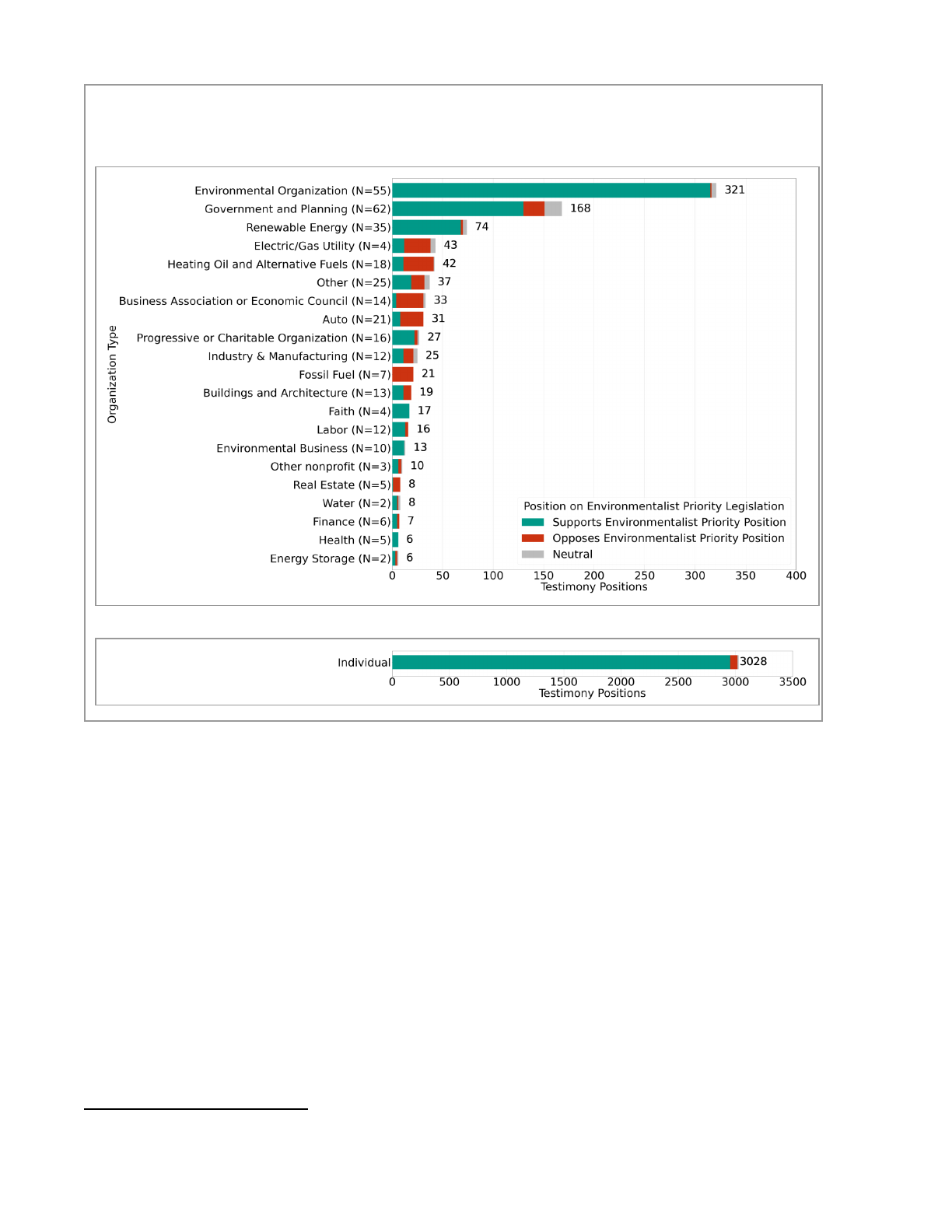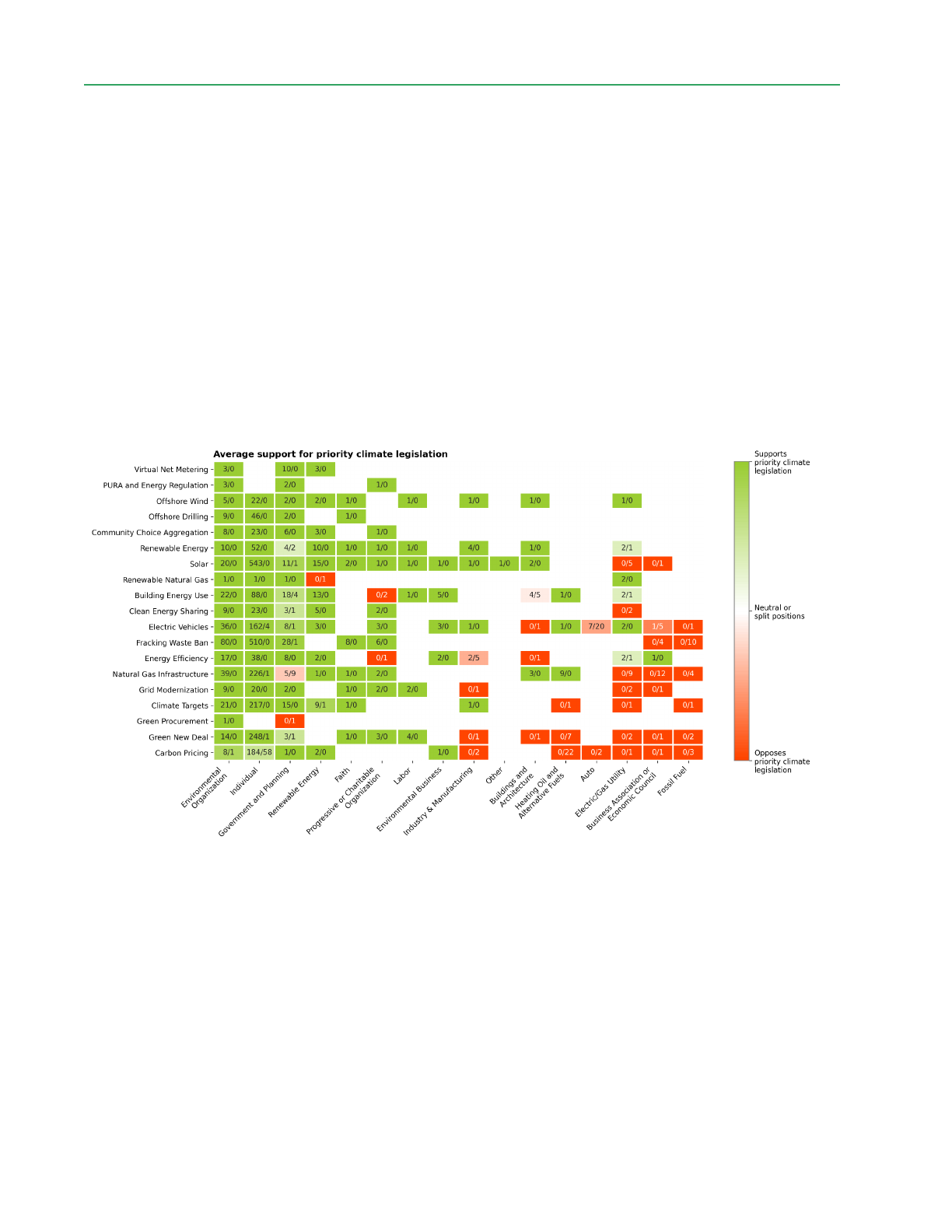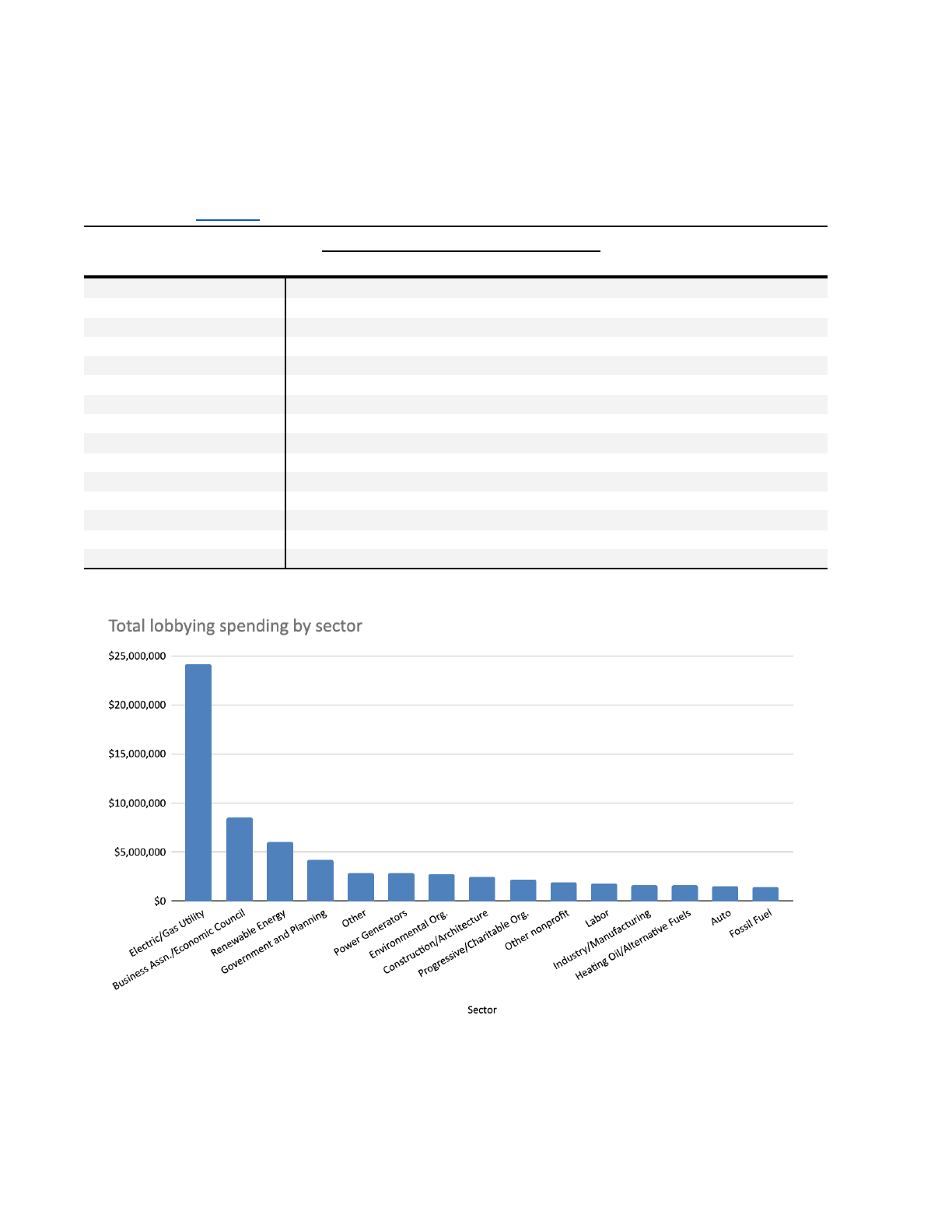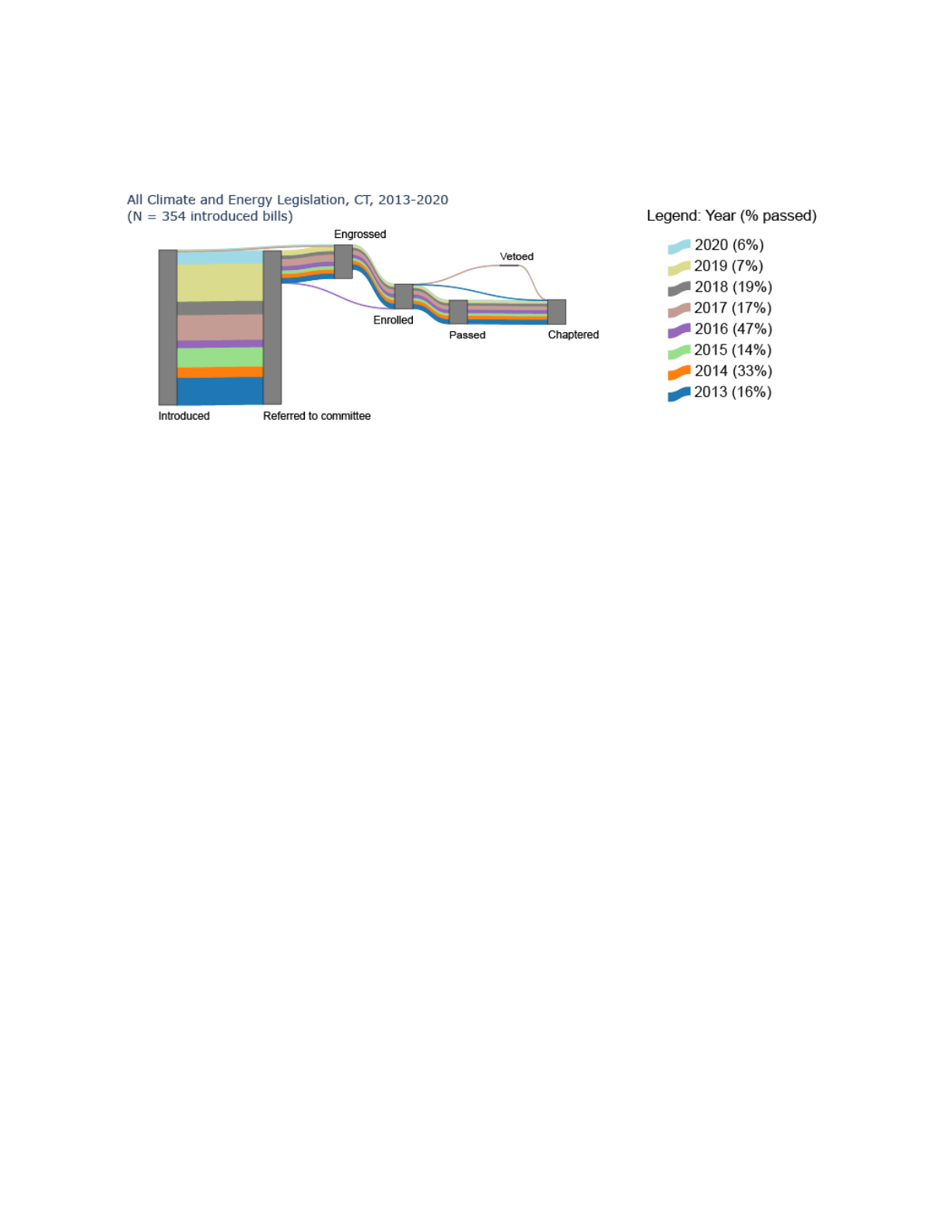
CSSN Research Report 2021:3
Who’s Influencing Connecticut
Climate and Clean Energy Politics?
Five Questions
Policy Briefing
The Climate and Development Lab
Institute at Brown for Environment and Society
December 2021

About the authors
Trevor Culhane and Galen Hall are recent graduates
of Brown University and researchers in the Climate
and Development Lab at Brown University. J.
Timmons Roberts is Ittleson Professor of
Environmental Studies and Sociology in the Institute
at Brown for Environment and Society, and
Executive Director of the Climate Social Science
Network.
Produced by the Climate and
Development Lab
The Climate and Development Lab is a think tank at
Brown University informing a more just, equitable,
and effective global climate change policy. It is
housed at the Institute at Brown for Environment
and Society (see IBES.Brown.edu). The Institute at
Brown for Environment and Society (IBES)
supports research to understand the interactions
between natural, human and social systems. Our
teaching programs prepare future leaders to
envision and build a just and sustainable world.
About CSSN
This report is being released through the Climate
Social Science Network (CSSN.org), a global
network of scholars headquartered at the Institute
at Brown for Environment and Society, launched in
October, 2020. CSSN seeks to coordinate, conduct
and support peer-reviewed research into the
institutional and cultural dynamics of the political
conflict over climate change, and assist scholars in
outreach to policymakers and the public.
This report should be cited as:
Trevor Culhane, Galen Hall, and J. Timmons
Roberts. 2021. Who’s Influencing Connecticut
Climate and Clean Energy Politics? Five Questions.”
CSSN Research Report 2021:3. CSSN.org
Published by CSSN, December 2021
Trevor Culhane, Galen Hall, and J. Timmons Roberts
http://www.cssn.org/
Cover photo credit: Shutterstock, Real Window
Creative
Climate Social Science Network
Institute at Brown for Environment and Society
135 Waterman Street, Providence RI 02912 USA
Email: [email protected]
Twitter: @ClimateSSN
More publications and information available at
CSSN.org
Acknowledgements
We appreciate support for this research from the
Barr Foundation. The opinions expressed in this
report are those of the authors and do not
necessarily reflect the views of the Barr Foundation.
We would also like to thank our interviewees and the
legislative staffers who provided testimony in
response to our requests. The support of the
Institute at Brown for Environment and Society has
been crucial to this project’s success.
Research Report: Who’s Influencing Connecticut Climate and Clean Energy Politics? Five Questions // 2

Executive Summary
Who is testifying at the Connecticut Capitol on climate and clean energy? What arguments are those
testifying against climate action using? What happens to clean energy bills? Who’s lobbying? What
economic sectors are most actively among those opposing climate solutions legislation in Connecticut
and what positions are they taking?
To address these questions, we analyzed publicly available written testimony on 48 bills that key
organizations and coalitions working on climate policy in Connecticut
1
saw as priority legislation from
2013-2020. In total, we analyzed 2,940 pieces of testimony, comprising 3,958 positions on legislation. We
carefully read and summarize 263 pieces of opposition testimony to capture dominant discourses against
climate solutions as they’ve been proposed in the state.
Electric and gas utilities spent over $24 million on lobbying over the eight years of this study, four times
that of renewable energy firms, and over eight times that of environmental organizations.
We find strong support for climate action in written testimony: 91.7% of the positions taken on climate and
clean energy bills supported priority climate legislation. This strong support spanned every year from
2013-2020 and nearly all issues. Large numbers of testifiers supported legislation to ban fracking waste in
Connecticut, facilitate shared solar energy, encourage electric vehicles, institute carbon pricing, create a
Green New Deal and limit new natural gas infrastructure. Individuals speaking on their own behalf made
up the largest segment of testimony, submitting over 3,000 positions on these bills - almost all in support
of climate solutions legislation.
Opposition to key environmental organizations’ positions on climate legislation was most frequently heard
from lobbyists and other staff from heating oil and alternative fuels companies, business associations,
and electric and gas utilities. In addition, the majority of positions taken in testimony from the utilities,
heating oils, business associations, auto, fossil fuel, and real estate sectors opposed key environmental
organizations’ positions on climate legislation. Eversource Energy and Avangrid/UIL Holdings submitted
over 20 positions each on a variety of issues. Two high-spending sectors identified in our lobbying analysis
were nearly completely absent from testimony: power generators and natural gas pipeline companies.
Rather than attacking climate science, testimony in the Connecticut legislature sought to delay or stop the
passage of individual climate and clean energy bills. We identified nine discourses frequently utilized in
opposing priority climate legislation. The natural gas industry and supporters argued that its expansion is
essential for the state economy. Climate bills were seen as disproportionately harmful to low-income
1
We selected these bills because key environmental organizations, primarily the Connecticut League of Conservation Voters
and Save the Sound/Connecticut Fund for the Environment, saw these as priority climate and clean energy bills. These
groups were selected in part because they consistently maintain publicly available lists of legislation related to climate and
clean energy. Full bill list available in Appendix.
Research Report: Who’s Influencing Connecticut Climate and Clean Energy Politics? Five Questions // 3

residents, and carbon pricing was dismissed as just another tax. Several industries expressed a strong
aversion to regulation and a preference for market-based incentives. Fossil fuel supporters argued that
renewables and EVs are being given unfair advantages. Connecticut was presented by representatives of
oil and gas distributors and the business association CBIA as too small to matter for the climate, and that
adoption of proposed policies would make the state appear anti-business. Finally, several industry
representatives argued that they and the state are already leaders on climate change.
We conclude with several recommendations:
Recommendations for the Legislature:
1: Evaluate and address utilities’ political influence.
2: Understand the new climate discourses.
3: Improve public voice and accountability at the Capitol.
4: Improve transparency and accountability.
Recommendations for Proponents:
1: Identifying opportunities for business support can advance policy.
2: Business lobbies may not be representing their members’ interests.
3: Broader coalitions can succeed.
Research Report: Who’s Influencing Connecticut Climate and Clean Energy Politics? Five Questions // 4

Contents
Executive Summary 3
Contents 5
Introduction and Background 6
Methods 9
Question 1: Who’s testifying at the capitol on climate change and clean energy? 11
Question 2: What issues do key groups support and oppose? 15
Question 3: Who’s spending most on lobbying in Connecticut? 19
Question 4: What happens to climate and clean energy legislation? 22
Question 5: What arguments are those testifying against climate action using? 24
Recommendations 33
Recommendations for the Legislature 33
Recommendations for Proponents 34
Acknowledgements 35
Appendix 36
Research Report: Who’s Influencing Connecticut Climate and Clean Energy Politics? Five Questions // 5

Introduction and Background
Gridlock in Washington over climate change and clean energy has now stretched over three decades. This
is in spite of worsening climate disasters and the steady accumulation of scientific studies documenting
that climate change is real, is urgent, and that humans are the cause. In this vacuum at the federal level,
states have become key battlegrounds for how the U.S. addresses this problem.
In the early years, Connecticut showed the way.
2
Connecticut jumped out in front in 1990 on climate
action, being the first state in the country to pass legislation requiring specific actions to reduce carbon
dioxide emissions. In 2001 the state joined a regional compact
3
with the goal of reducing emissions by
2010 and 2020, and including a long-term goal to reduce emissions to a level that would “eliminat[e] the
negative impacts of climate change”—a goal scientists suggested at the time would require 75 to 85
percent reductions by 2050. The state released a framework to meet those goals in 2002
4
, and published
in 2003 the nation’s first statewide greenhouse gas inventory. Nine months of consultations led to the
2004 Connecticut Stakeholder Recommendations, and that year Public Act 04-252 committed the state to
doing its share of the regional efforts.
5
2005 saw the release of the Connecticut Climate Change Action
Plan and the state’s joining of the Regional Greenhouse Gas Initiative (RGGI), which focused on power
plant emissions.
In 2007 a bill required energy efficiency be the first choice in investments to meet electricity demand
(called Least Cost Procurement) and increased the state’s Renewable Portfolio Standard.
6
The
highest-profile step, however, was the drafting, passage, and signing of the Global Warming Solutions Act
(Public Act 08-98) in 2008, which set mandatory targets for the state to reduce its emissions by 2020 and
2050.
7
That same year, Governor Jodi Rell joined Governors Schwarzenegger, Sebelius and Corzine and 14
other signatories at Yale University to broadcast their Governors' Declaration on Climate Change. The goal
was fashioning a partnership between federal and state action on climate change. These early climate
actions in Connecticut were followed by more initiatives, departments, and plans, many focused on coping
with the rapidly increasing impacts of climate change on the state, including sea level rise, storm surges,
heat waves and flooding. Recent examples among these are the Governor’s Council on Climate Change
and the Comprehensive Energy Strategy issued by the Connecticut Department of Energy and
Environmental Protection (DEEP).
8
8
See https://portal.ct.gov/DEEP/Climate-Change/GC3/Governors-Council-on-Climate-Change.
7
The Global Warming Solutions Act (Public Act 08-98) set mandatory GHG reduction targets of 10% below 1990 levels by
2020 and 80% below 2001 levels by 2050.
6
An Act Concerning Electricity and Energy Efficiency (Public Act 07-242).
5
An Act Concerning Climate Change (Public Act 04-252).
4
Leading By Example Connecticut Collaborates to Reduce Greenhouse Gas Emissions,which establishes a framework for CT
to meet its GHG reduction goals.
3
New England Governors and Eastern Canadian Premiers (NEG/ECP) Climate Change Action Plan 2001. This was the first
international climate initiative aimed at collectively reducing GHG emissions.
2
The historical parts of this section draw heavily on “History of Climate Action in Connecticut” Yale Case #PH-16-01.
Published November 04, 2016.
Research Report: Who’s Influencing Connecticut Climate and Clean Energy Politics? Five Questions // 6

However the science of climate change has become far more dire, suggesting near complete phaseouts
of fossil fuels will be needed by 2050, or even 2040.
9
Just in the last year, legislatures in neighboring states
have passed a new generation of climate bills calling for the halving of emissions by 2030 and net zero
emissions by 2050. Connecticut has executive orders and bills calling for 45 percent reduction by 2030 but
still has an overall 2050 target of 80 percent reductions.
10
Advocates for climate action and clean energy in
the state have grown increasingly frustrated as bills have died in the legislature, and clean energy funds
levied on utility customers’ bills are sometimes diverted into the general fund to meet budget shortfalls.
11
Two recent examples are carbon pricing legislation and later initiatives inspired by the Green New Deal,
which despite large numbers of testifiers in favor, did not move out of committee.
To understand who exerts influence on climate policy in Connecticut, the Climate and Development Lab at
Brown University has systematically reviewed capitol lobbying and testimony records for and against
climate and energy legislation. We collected lists of priority legislation from top statewide climate
advocacy groups and then created databases of all testimony in legislative committees that were
considering priority legislation on climate change and clean energy, and lobbying expenditures and visits
to the Capitol and state agencies reported by industrial and environmental organizations on energy. This
briefing is based on systematic collection and analysis of 2,940 pieces of testimony on environmental
organizations’ priority bills from 2013 to 2020, and records of lobbying on “Energy” issues as reported to
the Connecticut Secretary of State over the period 2013-2020.
12
After initial research on campaign
contributions, we concluded that systematic work in understanding this area was not possible.
Our review resulted in answers to five broad questions: Who’s testifying at the Capitol on climate and clean
energy? What issues do key groups support and oppose--who’s lining up in opposition to priority climate
legislation, and why? Who’s spending most on lobbying? How many clean energy bills survived the
legislative process? And finally, what arguments are those testifying against proposed climate solutions
using? For three of these questions we offer numerical findings of broad patterns on testifying and
lobbying. On two others, we carefully read and summarize opposition testimony to capture dominant
discourses against climate action as it’s been proposed in the state.
Electric and gas utilities spent over $24 million on lobbying over the eight years of this study, four times
that of renewable energy firms, and over eight times that of environmental organizations.
We found that 91.7% of testimony supported priority climate bills, across every year and nearly all issues.
Individuals speaking on their own behalf made up the largest segment of testimony, submitting over 3,000
positions on these bills - almost all in support of climate solutions legislation. Large numbers of testifiers
supported legislation to ban fracking waste in Connecticut, facilitate shared solar energy, encourage
electric vehicles, institute carbon pricing, create a Green New Deal and limit new natural gas infrastructure.
12
We acknowledge the importance of nuclear energy in Connecticut, but have excluded it from the study to focus on
renewable energy and climate bills.
11
In 2018 $145 million was swept from the state’s clean energy fund to cover general budget shortfalls. Robert Walton,
“Connecticut Can Use Efficiency Funds to Cover Budget Shortfall, Court Rules,” Utility Dive, October 30, 2018.
10
SB7 was the 2018 Act Concerning Climate Change Planning and Resiliency. Office of Governor Ned Lamont. 2019.
Governor Lamont Signs Executive Order Strengthening Connecticut’s Efforts to Mitigate Climate Change. Press Release
September 3, 2019.
9
Intergovernmental Panel on Climate Change 2018. Special Report on 1.5C Degrees of Warming. IPCC; National Climate
Assessment 2018. Washington, DC.
Research Report: Who’s Influencing Connecticut Climate and Clean Energy Politics? Five Questions // 7

Opposition to key environmental organizations’ positions on climate legislation was most frequently heard
from lobbyists and other staff from heating oil and alternative fuels companies, business associations,
and electric and gas utilities. In addition, the majority of positions taken in testimony from the utilities,
heating oils, business associations, auto, fossil fuel, and real estate sectors opposed environmentalists’
positions on key climate legislation. Eversource Energy and Avangrid/UIL Holdings submitted more
positions than any other firms, and the Connecticut Business and Industry Council (CBIA) and the CT
Petroleum Council were most frequently opposed. Two highly engaged sectors identified in our lobbying
analysis were nearly completely absent from testimony: power generators and natural gas pipeline
companies.
Rather than attacking climate science or denying the reality of the problem, opposition testimony in the
Connecticut legislature sought to delay or stop the passage of individual climate and clean energy bills.
We identified nine discourses frequently utilized in opposing priority climate legislation. The natural gas
industry and supporters argued that its expansion is essential for the state economy. Climate bills were
seen as disproportionately harmful to low-income residents, and carbon pricing was dismissed as just
another tax. Several industries expressed a strong aversion to regulation and a preference for
market-based incentives. Fossil fuel supporters argued that renewables and EVs are being given unfair
advantages. Connecticut was presented by representatives of oil and gas distributors and the business
association CBIA as too small to matter for the climate, and that adoption of proposed policies would
make the state appear anti-business. Finally, several industry representatives argued that they and the
state are already leaders on climate change. The report concludes with a series of recommendations.
Research Report: Who’s Influencing Connecticut Climate and Clean Energy Politics? Five Questions // 8

Methods
The bulk of research for this study was conducted from July 2020 to June 2021. The Connecticut Capitol
Complex was closed to visitors due to the COVID-19 pandemic for the entire research period and remains
closed at this writing.
13
Therefore we scraped full sets of written testimony and lobbying data from state
websites.
14
In the end we were able to remotely access all the information we needed, including
systematic collections of information about the introduction and fate of climate and clean energy
legislation in Connecticut, all lobbying records, and written testimony given on priority bills. To understand
some of the political context, we also conducted a series of ten interviews with experts, activists, and
former state officials, by video call. We describe each part of these methods, and then turn to our findings.
Legislation
We created three databases. One sought to track the fate of all climate and clean energy bills introduced in
the legislature from 2013 to 2020. For this stage, which informs our responses to Question 4, we used a
keyword search
15
and identified 354 bills related to climate and clean energy introduced. We used this list
of bills to chart the course of climate and clean energy legislation through the legislature, using LegiScan’s
bill tracking site.
Our testimony analysis focused on climate and clean energy bills that major climate-focused
organizations placed on their legislative priority lists. Focusing on these 48 bills allows us to capture the
key debates and analyze which groups support and oppose the efforts of key environmental
organizations. We collected lists online of bills these groups identified as priorities from 2013-2020
16
and
focused on bills on which the groups held a clear position.
Testimony Analysis
To collect testimony, we downloaded all pieces of written testimony available on the Connecticut
legislature’s website on 48 priority climate bills. From these, we removed comments and testimony from
state legislators, supplemental materials, and duplicates, leaving us with a total of 2,940 pieces of public
testimony on priority bills.
For each piece of testimony, we assessed who delivered it (and whether the testimony was given on
behalf of an organization), the bills upon which they testified, and the positions they took on each.
17
Organization names were standardized and grouped with a parent organization if applicable (for example,
AARP national and AARP Connecticut were both considered as testimony from “AARP”), and organizations
17
Testimony that expressed concerns about legislation was categorized as opposition.
16
We collected lists of bills from Connecticut League of Conservation Voters and Save the Sound from every year from
2013-2020. In addition, we collected priority bills as available from Sierra Club Connecticut, New England Clean Energy
Council, Connecticut Citizen Action Group, and Citizens Campaign for the Environment. Full list included in the Appendix.
15
The list of keywords is included in the Appendix. Our keyword search returned a large number of bills, from these we
manually excluded legislation not related to clean energy or climate change.
14
We downloaded recordings and transcripts of committee hearings and floor debates, but did not include them in our
analysis because we were not able to narrow testimony to priority climate bills.
13
Connecticut General Assembly website. “Please Note: The Capitol Complex is Currently Closed. Accessed 27 June, 2020.
https://www.cga.ct.gov Pazniokis, Mark. May 19, 2021. Connecticut is now open for business, but the state Capitol remains
closed to the public.
Research Report: Who’s Influencing Connecticut Climate and Clean Energy Politics? Five Questions // 9

organized around a clear industry interest were categorized under that industry. For example the Coalition
for Community Solar Access is organized largely by and for solar interests, so it was categorized as part
of the solar sector, even though it includes some environmental organizations. If an organization focused
on the environment, but emerged from a different kind of parent organization, they were coded with the
parent organization or type. For example, the United Church of Christ Northeast Environmental Justice
Center was categorized as a faith group, not an environmental group.
18
This grouping is intended to better
reflect the sector’s engagement with climate and energy issues.
Lobbying
To address Question 3: “Who’s spending most on lobbying in Connecticut?”, we created a third database
by downloading all publicly available lobbying records from the Connecticut State lobbying disclosure
website
19
for the four legislative sessions between 2013 and 2020. These records show the amount each
interest group spent on lobbying, who they paid to do the work of lobbying, and a set of “issues” on which
they lobbied for each legislative session. There was no “Climate change” option among these issues, so
we focused on those groups which recorded lobbying on “Energy” during at least one of the four sessions.
Over 400 interest groups recorded lobbying on “Energy” issues at least once over the four sessions we
studied. Some of these groups likely took at most a passing interest in climate legislation (e.g. Wine and
Spirits Wholesalers of CT). We therefore analyzed only those interest groups that either lobbied on
“Energy” during every session in which they were active, or testified on at least one environmental priority
bill. This filter selects for groups which more consistently engage in energy politics in Connecticut, leaving
us with 244 lobbying interest groups.
19
https://www.oseapps.ct.gov/NewLobbyist/PublicReports/PublicDashboard.aspx
18
Faith leaders were not categorized as speaking on behalf of an organization, unless they were a director of a particular
program and appeared to speak on that program’s behalf.
Research Report: Who’s Influencing Connecticut Climate and Clean Energy Politics? Five Questions // 10

Question 1: Who’s testifying at the capitol on
climate change and clean energy?
Who supports and opposes climate action in Connecticut? Which economic sectors have representatives
testify in support of climate and clean energy policies, and which sectors tend to oppose them? To
address these questions, we analyzed publicly available written testimony on 48 bills that key
climate-focused organizations
20
saw as climate and energy priorities from 2013-2020. In total, we
analyzed 2,940 pieces of testimony on these 48 bills, comprising 3,958 positions on legislation.
21
Finding 1.1: There is strong support for climate action in written testimony. 91.7% of the positions taken
on climate and clean energy bills supported priority climate legislation. There was strong support every
year from 2013-2020 and across different sub-issues. A majority of testifiers supported priority climate
legislation on 45 of the 48 bills we examined.
22
Finding 1.2: Individuals speaking on their own behalf made up the largest segment of testimony,
submitting over 3,000 positions on these bills - almost all in support of priority climate legislation
(Figure 1b). 97.5% of individuals’ positions on bills supported priority climate legislation. Opposition to
priority climate legislation from individuals was primarily limited to a carbon pricing bill (2018 HB-5363): 58
pieces of testimony were submitted against it, many of which were short emails arguing that carbon taxes
would be economically damaging to Connecticut (see Question 5).
23
Testimony is the only formal process
whereby the legislature invites public input on legislation, and this testimony demonstrates strong public
support for climate and clean energy policies.
Finding 1.3: Environmental organizations, government and planning groups, and renewable energy
companies are the most frequent testifiers in support of priority climate legislation (Figure 1a).
Progressive and charitable organizations, environmental businesses, faith groups, and labor groups also
give most of their testimony in favor of priority climate legislation, but do not appear frequently to support
priority climate bills. A majority of faith group testimony was for the fracking waste ban bill (Figure 2).
23
Other than carbon pricing, only six pieces of written testimony were submitted against major climate-focused
organizations by individuals on all other bills: four employees of car dealerships submitted testimony against direct sales of
electric vehicles, one person submitted testimony against the Green New Deal, and one individual in support of natural gas
pipelines.
22
For the other three bills, each with five or fewer pieces of testimony, two had equal support and opposition, and one had
more opposition than support (three positions opposing major climate-focused organizations, two supporting major
climate-focused organizations).
21
3,948 positions (99.7% of analyzed positions) were on bills key environmental groups supported, while 10 positions in
testimony were on 2 bills that key environmental groups opposed.
20
We selected these bills because key climate-focused organizations, primarily the Connecticut League of Conservation
Voters and Save the Sound/Connecticut Fund for the Environment, saw these as priority climate and clean energy bills.
These groups consistently maintain publicly available lists of legislation related to climate and clean energy.
Research Report: Who’s Influencing Connecticut Climate and Clean Energy Politics? Five Questions // 11

Testimony Positions For and Against Leading Environmental Organizations
a) Organization Testimony (N=number of organizations)
b) Individuals
Figure 1: Written testimony on key climate and energy bills 2013-2020, Connecticut.
Finding 1.4: Opposition to key climate legislation is concentrated in several sectors: Electric/Gas
Utilities, Heating Oil and Alternative Fuels, Business Association or Economic Councils, the Auto
industry, Fossil Fuels, and Real Estate. Of these, the utility, business association, and fossil fuel sectors
had the most engaged individual organizations: AVANGRID/UIL Holdings, CT Business and Industry
Association, CT Petroleum Council, and Eversource Energy submitted more than 10 positions each in
opposition to priority climate positions, more than double any other actor (Table 1b). In contrast, the auto
and heating oils sectors were composed of many smaller companies and organizations, each of which
submitted few pieces of testimony. Arguments made against climate action are outlined in Question 5.
Two of the biggest lobbying spenders on Energy - Spectra Energy Transmission II LLC and MMCT
Ventures LLC - did not submit any written testimony, and testimony from natural gas pipeline companies
and power generators was rare.
24
24
Lobbying analysis is explained in Question 3.
Research Report: Who’s Influencing Connecticut Climate and Clean Energy Politics? Five Questions // 12

Finding 1.5: The main support for priority climate legislation comes from better-resourced
environmental organizations and government/quasi-government agencies that focus on environmental
issues (Table 1a). Save the Sound and Sierra Club both testified over 30 times, while Environment
Connecticut, CT League of Conservation Voters, CT Citizen Action Group and Acadia Center all testified
over 15 times.
Research Report: Who’s Influencing Connecticut Climate and Clean Energy Politics? Five Questions // 13

Table 1: Top testifiers for and against priority climate legislation, Connecticut, 2013-2020.
(a) Groups taking ten public positions or more in support of leading environmental organizations on
climate bills.
Organization
Stance on Priority Climate Bills
Supports
Opposes
Neutral
Save the Sound
39
Sierra Club
33
1
1
Environment CT
22
CT League of Conservation Voters
21
CT Citizen Action Group
19
Acadia Center
16
CT Dept. of Energy & Environmental Protection
14
3
3
CT Green Bank
14
Citizens Campaign for the Environment
14
Clean Water Action
14
Ashford Clean Energy Task Force
12
CT Roundtable on Climate and Jobs
10
Environment and Human Health
10
Office of Consumer Counsel
10
3
3
(b) Opposition groups taking three public positions or more in opposition to leading environmental
organizations on climate bills.
Organization
Stance on Priority Climate Bills
Opposes
Supports
Neutral
AVANGRID/UIL Holdings Corporation
14
5
1
CT Business and Industry Association
13
3
1
CT Petroleum Council
13
Eversource Energy
12
5
4
CT Home Builders and Remodelers Assn.
5
1
Daniels Energy
5
CT Realtors
4
CT Energy Marketers Association
4
5
Santa Energy
3
Office of Consumer Counsel
3
10
3
Middlesex County Chamber of Commerce
3
CT Industrial Energy Consumers
3
CT Dept. of Energy & Environmental Protection
3
14
3
CT Conference of Municipalities
3
4
4
AARP
3
4
Research Report: Who’s Influencing Connecticut Climate and Clean Energy Politics? Five Questions // 14

Question 2: What issues do key groups support
and oppose?
We identified 19 issues among the 48 priority climate bills, such as banning the dumping of waste from
hydraulic fracturing, solar, wind, carbon pricing and the Green New Deal.
Finding 2.1: A majority of testifiers supported priority climate legislation (Figure 2). Bills related to
natural gas infrastructure, specifically regulating fracking waste and natural gas pipelines, received the
most testimony of the bills we examined, followed by bills related to solar energy, electric vehicles, and the
Green New Deal. The most contested issue area was carbon pricing (see Question 5).
Figure 2. Summed testimony positions on bills in each issue space from organizations in each sector. The
figure includes the top 15 sectors by total testimony given, sorted from the most favorable to leading
environmental groups’ positions on priority climate legislation (left) to the least favorable (right).
Annotations in each cell show the amount of testimony in support on the left and the amount in
opposition on the right. Where no organization in a sector testified in support or opposition to priority
legislation on a given issue the cell is left blank.
Finding 2.2: Solar legislation had strong advocate support and key utility opposition. Solar policies,
particularly policies to enable shared solar developments, saw strong support among environmental
Research Report: Who’s Influencing Connecticut Climate and Clean Energy Politics? Five Questions // 15

groups and their allies. These bills were among the most testified upon bills in our study, with 597
individual testifiers in support.
Six pieces of testimony were against solar bills. The utility industry testified strongly against legislation to
expand solar energy, particularly against two policies. The first, called net metering, allows home- and
business-owners to sell extra electricity produced by their solar panels back to the grid, and only be billed
for the net amount of extra energy needed from the grid. Second, utilities opposed shared clean energy
programs, which would allow energy consumers to subscribe to a local shared renewable energy project
and receive a credit on their utility bill for the power produced.
25
Eversource’s Stephen Gibelli testified on
2015 SB-928 that "As such we applaud the goals of this bill to further the development of renewable
resources within our state.[...] We are concerned that bills such as these will shift costs to
non-participating customers, which may particularly impact our low income customers.."
26
While environmental groups, labor, and many municipalities all supported solar energy and testified for
solar energy policies, specific proposals related to the method of solar development were contested.
Municipalities contested tax exemptions for certain new solar developments, some more
conservation-focused environmental groups worked to ensure solar siting would not jeopardize land
protections, and labor groups (along with environmental groups) called for prevailing wage standards for
new solar developments. These efforts were contested by some members of the Connecticut solar
industry, who see such attempts as barriers to their growth.
27
Finding 2.3: Offshore Wind bills had nearly universal support. In contrast to solar legislation, the priority
offshore wind bill included in our study, 2019 HB-7156, An Act Concerning The Procurement Of Energy
Derived From Offshore Wind, saw nearly universal support in testimony. Environmental groups, along with
labor, utility, faith, and renewable energy representatives all supported the project, although in relatively
small numbers. There was no written opposition testimony from business councils, the fossil fuel industry,
or most other sectors.
Eversource Energy, who is a leading developer of offshore wind energy in the Northeast, wrote,
“Eversource appreciates the leadership of Governor Lamont and the Connecticut legislature to take a
critical step in achieving Connecticut's clean energy economy. We fully support the State's efforts to
increase its offshore wind procurement authority. Offshore wind holds the promise to provide significant
quantities of affordable, carbon-free energy while supporting hundreds of new jobs in Connecticut and
throughout the Northeast.”
The only group to submit testimony against the bill was the New England Power Generators’ Association
(NEPGA), whose members represent approximately 26,000 megawatts of generating capacity in New
England. They wrote in testimony: “NEPGA opposes SB 875 and HB 7156 because both bills would
increase out-of-market procurements of offshore wind resources, which would further displace
27
Authors’ interview with solar industry representative.
26
This opposition is consistent with research on the utility industry’s efforts in neighboring states, see our recent report on
Massachusetts and see Short Circuiting Policy: Interest Groups and the Battle Over Clean Energy and Climate Policy in the
American States, by Leah Stokes (2020).
25
Environmental groups focused on the opportunities these programs would provide for solar energy developments in
particular.
Research Report: Who’s Influencing Connecticut Climate and Clean Energy Politics? Five Questions // 16

cost-effective generation in the wholesale market place, and, over time, expose consumers to the risks of
long-term contracts to support resources needed for reliability. Instead, if, as some proponents have
stated, this is a proposal intended to help Connecticut meet its Global Warming Solutions Act mandates,
NEPGA suggests the better, more competitive way would be to work with states in New England to set a
meaningful price on carbon dioxide emissions for electricity and other sectors of the economy –
particularly transportation.”
Finding 2.4: Bills restricting natural gas were highly contested and created unusual alignments. Bills
requiring better methane leakage efforts and restricting natural gas infrastructure brought support from
environmental organizations, the public, and delivered fuel companies. They were strongly resisted by
utilities, business councils and some municipal groups.
Environmental groups and individuals testified in favor of restrictions on natural gas expansion and
methane leaks, with 283 positions submitted in support of priority climate legislation out of 328 total
positions on natural gas infrastructure bills. They were joined by several government groups, along with
the heating oil and alternative fuels industry. In contrast, a broad array of groups, including business
councils, utilities, the fossil fuel industry, and other municipal and government groups, all testified in favor
of expanding natural gas infrastructure or insulating the industry from further regulation. Their arguments
are explored further in Question 5. Natural gas was a key issue for utilities, with Eversource and Avangrid
both testifying against bills to limit pipeline construction and reduce methane leaks in the state.
28
While heating oil and alternative fuel companies often opposed climate advocates on other issues, the two
sectors did align on natural gas infrastructure. Expanding natural gas infrastructure, particularly to rural
areas that don’t currently have it, would take customers away from heating oils and alternative fuels
companies. Heating oil companies testified for stronger policies regulating natural gas pipeline leaks.
Connecticut Energy Marketers Association (CEMA)’s President, Christian Herb, stated “The “no leak” policy
that applies to the 600 local family owned home heating oil/Bioheat® dealers along with the 1,400
gasoline station owners does not apply to Yankee Gas/Eversource and Southern Connecticut Gas and
Connecticut Natural Gas/Avangrid. This double standard is harmful to the environment and independently
owned businesses” (2020 HB-5350). On the other side, Steve Guveyan of the Connecticut Petroleum
Council argued on a major pipeline bill that "The bill […] discriminates sharply against natural gas by
eliminating interstate gas pipelines from the future energy mix. Barring pipeline expansion will inhibit
future economic growth [...] An all-of-the-above approach to energy supply works best” (2018 SB-332).
Finding 2.5: Carbon pricing was the most contested issue. An Act Establishing a Carbon Price for Fossil
Fuels Sold in Connecticut (2018 HB-5363), was the most contested bill in our study, with 97 positions from
testimony in opposition and 197 positions in support. The bill saw significant support from environmental
organizations and individuals, but little testimony from municipalities, renewable energy companies, and
other sectors who tend to support other climate bills.
29
29
The Sierra Club submitted testimony that they would not support the bill unless it were amended, writing that, “to earn our
support, the Sierra Club requests that HB-5363 be amended to: 1) Invest at least 50 percent of the revenues in opportunities
to reduce pollution, increase access to the benefits of clean energy, and help workers and communities move beyond dirty
energy, with a minimum level for overburdened and underserved communities. 2) Provide rebates only for residents in the
28
Eversource Energy is co-leader of the Consortium to Fight Electrification, whose mission is to “create effective,
customizable marketing materials to fight the electrification/anti-natural gas movement." See Leaked docs: Gas industry
secretly fights electrification, Benjamin Storrow, E&E News (2021).
Research Report: Who’s Influencing Connecticut Climate and Clean Energy Politics? Five Questions // 17

The 2018 hearing on carbon pricing legislation included 14 positions in written testimony from small
heating oil delivery companies. David Sousa, who declared in his written testimony on 2018 HB-5363 that
his family ran a heating oil company, said "This tax is a street sign that says, turn around if you are thinking
of moving to Connecticut. […] Meanwhile certain fuels like coal and oil are being vilified" (2018 HB-5363).
Jamie Lohr, President of Guardian Fuel and Energy testified that "In my company, and countless other
family heating oil dealerships across the state, we work to help families make good decisions in budgeting
for their fuel, and in making their homes energy efficient as possible."
30
CT Petroleum Council argued that “In effect, this is an income-redistribution program." "[I]t clearly picks
winners and losers." "Instead, let CAFÉ standards, appliance standards and Renewable Portfolio Standards
(RPS) lead the way so there aren't overlapping regulatory requirements for greenhouse gas emissions"
(2018 HB-5363).
Finding 2.6: Opposition to electric vehicle bills focused on dealerships. 33 pieces of testimony on
priority climate legislation opposed legislation to promote electric vehicles, in contrast to 470 pieces of
testimony in support. Most of the opposition came from the auto industry, whose testimony on priority
climate legislation from 2013-2020 focused on opposing policies to allow the direct sale of electric
vehicles, the sales model proposed by Tesla over several years. In this way, auto industry testimony was
not explicitly against a climate solution, but against how it was to be marketed. Most of this testimony
came from individual dealerships, who testified against the direct sales model used by Tesla, which drops
cars off at purchasers’ homes. Auto dealerships see the direct sales model as a threat to their industry,
stating that allowing this model for electric vehicles would be a slippery slope towards eliminating the
dealership business in Connecticut. A series of dealers elaborated about the benefits they bring to
communities and customers. The Alliance of Automobile Manufacturers argued that "As drafted, the bill
would seemingly only allow Tesla to sell outside the franchise system governing every other manufacturer.
But what will the legislature do when the next company decides to enter the U.S. market to sell electric
vehicles? There are 23 major automakers that sell around the world, but not in the U.S." (2019 HB-7142). A
few dealers argued that their dealerships do sell electric vehicles, and that they would soon be selling
more.
30
Erin Santa Mercede made many of the same points that were made in the letters sent by other heating oil companies:
"Half the homes in the state are heated with fuel oil. A 16.55 cents/gall tax on home heating oil would cost homeowners
$166 per year individually, or over $72 million per year in aggregate. And that's just in year one [...] The tax is a "feel good" tax
that won't affect climate change. According to a U.S. News & World Report article, even if the U.S. completely stopped
emitting all CO2, it would reduce world temperatures by only 0.08 degrees C by the year 2050." (2018 HB-5363)
lower income quintiles and small businesses, to ensure those who are most disadvantaged by our current energy and
economic systems are better off.”
Research Report: Who’s Influencing Connecticut Climate and Clean Energy Politics? Five Questions // 18

Question 3: Who’s spending most on lobbying
in Connecticut?
Lobbying disclosures give a sense of the resources that different interest groups draw upon in their
attempts to influence climate legislation. Because lobbying disclosures in Connecticut only list interest
groups’ expenditures, the lobbyists they hired, and a set of “issues” on which they lobbied during each
two-year session, we can say little about the details involved in lobbying activities in Connecticut.
31
Nonetheless, these records show important disparities in the amount of resources different interest
groups can draw on to influence the legislature.
As mentioned in the methods section, we start with over 400 interest groups who recorded lobbying on
“Energy” issues at least once over the four sessions we studied. Selecting only groups which engage
consistently (all years) or publicly (through testimony) on energy or climate change leaves us with 244
lobbying interest groups.
Finding 3.1: Lobbying spending is highly unequal
The distribution of lobbying budgets within this group skews heavily towards a set of high-spending
interests (Table 2). As is often the case, nonprofits comprise a large fraction of climate and clean
energy advocates in Connecticut, but they face a stiff spending imbalance in the arena of lobbying.
The median environmental organization spent $76,000 on lobbying over the eight-year period. At least
40 renewable energy firms also lobby actively in Connecticut, but most of them have small budgets —
the median is $39,608 over eight years. These figures compare to $181,000 over the same period
from the median power generation firm and $320,000 from the median electric or gas utility. Based
on these records, the median environmental organization or renewables firm has between one half
and one fourth of the lobbying budget of the median fossil-powered generation firm or electric and
gas utility company.
These differences are even more stark among the top-spending interest groups in each sector.
Among environmental organizations, Consumers for Sensible Energy (an anti-pipeline advocacy
group with undisclosed donors and a focus on elite lobbying
32
) spent $1.1 million on lobbying over
this period — almost double the next-highest environmental group, Save the Sound. NRG Energy, the
top renewables firm, spent only slightly more ($1.6 million). Conversely, the top utility, Eversource,
spent nearly $6.8 million on lobbying, and the Connecticut Business and Industry Association (CBIA)
spent nearly $4.6 million. Both were among the top five most consistent testifiers against priority
climate legislation. Further, the top ten interest groups active in the climate and energy space in
32
Bruce Mohl, “Who’s behind Consumer Energy Group?,” CommonWealth Magazine, December 4, 2017.
31
We cannot identify all groups who lobbied on climate legislation; the closest this data allows is to find groups which
registered having lobbied on “Energy”. Unlike in Massachusetts, where lobbying data is far more detailed, we have to rely
entirely on testimony to describe the detailed policy preferences of these interest groups.
Research Report: Who’s Influencing Connecticut Climate and Clean Energy Politics? Five Questions // 19

Connecticut (Table 3) include utilities, generation companies, and other industrial interests, but no
renewables or environmental groups.
Table 2: Lobbying by sector. The top 15 sectors by total lobbying spending over the period are
shown. “Highest Spender” identifies the organization with the greatest total spending over the period
in each sector. (Source)
Sector
N
Lobbying spending, 2013-2020
Highest Spender
Median
Total
Highest
Electric/Gas Utility
25
$291,872
$24,206,899
$6,776,686
Eversource
Business Assn./Council
17
$153,533
$8,556,964
$4,575,350
CT Business & Industry Assn.
Renewable Energy
40
$39,608
$6,022,834
$1,587,587
NRG Energy Inc.
Government and Planning
9
$236,000
$4,167,360
$1,773,945
CT Conference of Municipalities
Other
12
$17,998
$2,915,432
$2,666,296
MMCT Ventures Inc.
Power Generators
15
$154,288
$2,852,172
$816,342
CPV Towantic Inc.
Environmental Org.
14
$72,463
$2,761,036
$1,130,749
Consumers for Sensible Energy
Construction/Architecture
4
$385,715
$2,494,406
$1,718,976
CT Construction Ind. Assn.
Progressive/Charitable Org.
14
$133,093
$2,244,458
$519,851
CT Legal Services Inc.
Other nonprofit
1
$1,884,814
$1,884,814
$1,884,814
AARP
Labor
6
$227,994
$1,818,069
$858,236
Operating Engineers Union
Industry/Manufacturing
13
$39,502
$1,627,380
$498,593
CT Ind. Energy Consumers
Heating Oil/Alt. Fuels
9
$78,951
$1,611,655
$635,788
Covanta Energy LLC
Auto
4
$292,676
$1,547,219
$961,648
Tesla Motors Inc.
Fossil Fuel
5
$108,060
$1,439,191
$743,650
CT Petroleum Council
Figure 3: Total lobbying spending by sector from 2013-2020.
Lobbying budgets only convey one part of the strategic landscape surrounding energy policy. Many
groups -- especially environmental organizations -- do more than just lobby; they run public education
Research Report: Who’s Influencing Connecticut Climate and Clean Energy Politics? Five Questions // 20

and pressure campaigns, protests and acts of civil disobedience, mutual aid, and use other tactics to
engage with the public as much as, or more than, they engage political elites. Nonetheless, in the
arena of elite lobbying we have seen that interest groups advancing progressive climate policies likely
face systemic disadvantages.
Table 3: Top ten lobbying spending groups in Connecticut, 2013-2020. Includes only interest
groups which registered lobbying on energy during every active session. Organizations sorted by
average yearly budget.
(Source)
Principal
2013-2014
2015-2016
2017-2018
2019-2020
Average
Total
Eversource
$1,572,710
$1,598,955
$1,864,802
$1,740,220
$1,694,172
$6,776,686
CT Business and Industry
Association
$1,091,215
$1,280,196
$1,407,271
$796,669
$1,143,838
$4,575,350
Spectra Energy Transmission II
LLC
$612,857
$2,399,006
$722,216
$244,605
$994,671
$3,978,685
Move CT Forward
$973,651
$986,126
$979,889
$1,959,778
Dominion Energy
$919,104
$878,241
$946,401
$875,370
$904,779
$3,619,116
MMCT Ventures LLC
$421,091
$1,271,748
$973,458
$888,765
$2,666,296
Avangrid/UIL Holdings Corp.
$878,445
$778,839
$579,448
$614,949
$712,920
$2,851,681
AARP
$798,875
$573,669
$262,909
$249,360
$471,204
$1,884,814
CT Conference of Municipalities
$358,138
$412,989
$526,671
$476,147
$443,486
$1,773,945
The CT Construction Industries
Association
$308,136
$372,712
$511,094
$527,033
$429,744
$1,718,976
Total
$6,539,481
$8,715,698
$9,066,212
$7,483,937
$8,663,468
$31,805,328
Research Report: Who’s Influencing Connecticut Climate and Clean Energy Politics? Five Questions // 21

Question 4: What happens to climate and clean
energy legislation?
There are numerous steps a bill must go through to become a law in Connecticut.
33
At multiple
stages throughout the process, a bill may be killed, amended, merged with other bills, or rewritten
entirely. While we will not review the entire process for how a bill becomes a law here, there are
several key decision points worth noting. First, the bill must be introduced, either by the governor, a
committee, or an individual legislator (individual legislators are only able to introduce bills in
odd-numbered years). Introduced bills are then referred to a committee; the committee then decides
whether to hold a hearing for a bill, where public testimony can be heard. After a hearing, bills may be
screened - sometimes several times - where the Legislative Commissioners Office writes the bill into
a draft law. For bills introduced by individual legislators, the committee can “vote to draft” the bill -
this step is necessary for the bill to move forward.
The committee will then pass the bill forward or hold the bill - effectively killing the bill. Bills may also
be sent to other committees. If the bill makes it out of committee, it is studied by the Offices of
Legislative Research and Fiscal Analysis, which creates a report about the bill’s impacts. If the bill will
cost the state money, the bill may move to the Appropriations Committee. After negotiations, in which
the bill can be amended or rewritten multiple times, the bill can move to a floor vote in either the
House or the Senate (depending on where the bill originated). If the bill passes each chamber in
identical form, it moves to the Governor’s Office. The governor can then sign the bill into law, or veto it
- the legislature may override a governor’s veto with a two-thirds majority vote of both chambers.
33
Shaiken, Ben. “HOW A BILL BECOMES A LAW Connecticut Edition!” Prepared by Ben Shaiken, Chair of Mansfield
Democratic Town Committee. Accessed 28 June 2021.
Research Report: Who’s Influencing Connecticut Climate and Clean Energy Politics? Five Questions // 22

Figure 4: Sankey diagram of climate and clean energy legislation in the Connecticut legislature,
2013-2020. All bills uncovered in keyword search (n = 354).
We find that most climate legislation dies in the original committee in which it was introduced. Of all
354 introduced climate and energy bills, only 78 actually made it out of committee and 56 were
chaptered into law by the Governor (Fig. 4), a survival rate of 16 percent. These statistics emphasize
the importance of influence over committee agendas: while introduced bills are unlikely to pass, the
majority of bills that leave committee are signed into law. On the one hand, this means that when the
full legislature gets to have input on climate bills, they pass those bills. The other way to look at it is
that most legislators don’t get to decide at all about the bulk of energy legislation—it’s been decided
for them before it reaches the floor.
Plotting by year, there are certain years where especially large numbers of bills were introduced, like
2019, when 85 climate and energy-related bills were introduced. But that year was no more
productive in the end than other years; in fact, 2013, 2014 and 2017 each had eight or more bills
signed into law (nine, eight and nine respectively). In terms of “yield” of introduced bills making it
through the process, 2016 was an exceptional year, with nearly half making it through (47%). In six out
of eight years, over 80% of bills were killed, nearly all in the committee where they were introduced. In
2020, just more than 1 in 20 climate and clean energy bills introduced survived (6%).
Research Report: Who’s Influencing Connecticut Climate and Clean Energy Politics? Five Questions // 23

Question 5: What arguments are those
testifying against climate action using?
We reviewed and summarized 263 pieces of written testimony submitted in opposition to 48 priority
climate bills for the years 2013-2020. Not one directly disputed the reality of climate change, and many
expressed their sector’s great concern about environmental issues.
34
But the majority of opposition
testimony downplayed climate change and the efforts being made in the state, and the particular bills
being discussed.
35
Rather than attacking climate science, testimony in the Connecticut legislature sought
to delay or stop the passage of individual climate and clean energy bills. We identified nine discourses
frequently utilized in opposing priority climate legislation, as described below.
Argument 1: Natural gas is essential for Connecticut
Fossil fuel, utility, and labor groups all argued that Connecticut needs a consistent or increasing supply of
natural gas to meet its needs for emissions reduction, energy security, lower energy costs, and
employment.
Over several legislative sessions, Steve Guveyan, local lobbyist for the American Petroleum Institute
(whose national annual budget is over $240 million
36
), argued that the state needs "natural gas---an
abundant, low-carbon, low-greenhouse gas emitting, easily-transported, domestically-produced fuel" (2019
testimony against HB-6242). He and others pointed to emissions being lower thanks to the transition from
coal and oil-generating power plants to gas, that methane leaks are being adequately addressed, and that
pipelines create jobs. His 2014 testimony against SB-237 similarly argued that "Increased use of natural
gas [...] is environmentally beneficial. It will reduce sulfur, PM and mercury emissions, and reduce
greenhouse gas emissions by 30% compared to oil and 45% compared to coal. [...] the country needs an
all-out, all-of-the-above energy strategy that develops every available source of American energy" (2014
SB-237). In response to a 2020 bill, HB-5350, designed to make expansion of natural gas service more
difficult, Patrick McDonnell of Avangrid argued that “Without a comprehensive plan to decarbonize our
electric grid in concert with switching to electrifying our transportation and heating sources, we run the
risk of relying on even dirtier oil fired generation plants to meet our electricity need.”
36
ProPublica. IRS 990 Form for 2018. American Petroleum Institute. Accessed 9 June 2021.
35
Several cited the Intergovernmental Panel on Climate Change to argue that the U.S. shouldn’t act aggressively on climate
change: The “(IPCC) Assessment Report claims that even if the U.S. as a whole stopped emitting all carbon dioxide
emissions immediately, the ultimate impact on projected global temperature rise would be a reduction of only about 0.08°C
by the year 2050. China and India will dominate global carbon dioxide emissions for the next century, and there’s little the
U.S., let alone Connecticut can do, to change this.” This 2020 testimony, from Christian Herb of the Connecticut Energy
Marketers Association (CEMA) against a Green New Deal bill SB-354, reflects the position they lay out on their website,
asking member oil heat delivery companies to support “our lobbying, consumer outreach, and PR efforts” against the state’s
“diabolical” climate planning.“ From CEMA. 2021. Industry Defense Fund. Accessed 9 June 2021.
34
Three organizations testified against another bill in 2018 (SB-345) that would have included climate change education in
state minimum standards. Remarkably, the Senior Counsel of the Connecticut Business and Industry Association Eric
Brown testified against the use of the words “climate change education,” pushing instead "(line 19) to replace “climate
change” with “earth systems, including earth and human activity”. The Connecticut Association of Schools and the
Connecticut Conference of Municipalities argued that it was an unfunded mandate and would “only decrease the already
minimal amount of time educators have to work with their students on the core curriculum” (Hamzy, Donna, Advocacy
Manager).
Research Report: Who’s Influencing Connecticut Climate and Clean Energy Politics? Five Questions // 24

Eric Brown, Senior Counsel of the powerful Connecticut Business and Industry Association, has been a
frequent voice at the Capitol against climate and clean energy legislation. In 2019 he argued against limits
on expanding pipelines to the region: "Connecticut and New England will be highly dependent on natural
gas for decades to come. Expanding our access to plentiful, nearby quantities of natural gas would yield
economic and environmental benefits for our state and our ratepayers. It is disconcerting to us that the
state continues to make Connecticut a higher energy cost state to achieve greenhouse gas reduction
goals, while at the same time considering legislation that would eliminate a significant opportunity to
make Connecticut a more competitive, less expensive and cleaner energy state" (2019 HB-6242). In these
ways, natural gas is presented as the bedrock of the Connecticut economy and way of life.
Opponents frequently cited the reliability of energy as a reason to not change the status quo. One bill,
2018’s SB-332, included changes in the state’s Department of Energy and Environmental Protection
(DEEP)’s ability to override proposals on pipeline capacity. Gas and electricity utility Eversource’s Vincent
Pace testified against the change, citing a 2018 review of the 2016 cold snap and how gas shortages were
averted (2018 SB-332). Robert Klee, Commissioner of the DEEP, argued that "it is short-sighted to
eliminate this authority, as the underlying issues of natural gas infrastructure constraints, price volatility,
and potential grid reliability impacts persist" (2018 SB-332). The legislation limiting new natural gas
pipelines through the state was opposed by UIL Holdings, which became part of the Avangrid utility: "We
are opposed to House Bill 6242 because it will negatively impact our ability to provide our customers
reliable natural gas service" (2019 HB-6242).
Industry and some labor groups cited social and environmental reasons to support building pipelines. Ted
Grabowski of the Connecticut Laborers District Council argued in 2018 against SB-332 saying that "Our
working men and women who have worked on pipelines [...] take their work very seriously" and that
limiting gas would hurt the state’s economy.
Argument 2: Climate legislation will disproportionately hurt low-income
residents
One of the most frequent arguments being leveled against renewable energy, energy efficiency, and limits
on fossil fuels is that they will exacerbate inequality. For example, the American Petroleum Institute in
2013 came out against HB-6360, saying that "Passing the bill...means you support moving needlessly
from a lower priced fuel [heating oil] to a higher-priced fuel [ultra-low sulphur diesel], one that will impact
every low-income and middle-class family that uses home heating oil." Eversource’s Stephen Gibelli came
out against distributed electricity generation bill SB-928 in 2015, citing “concerns about the cost impact
that many of these new initiatives have on our customers.” CBIA’s Eric Brown made a similar argument on
the same bill, saying that “virtually all the costs and risks associated with such projects on
non-participating ratepayers – who would not even get the benefit of Class 1 energy generated under such
a system being counted towards meeting Connecticut’s highly aggressive and expensive Renewable
Portfolio Standard”. Avangrid’s precursor UIL’s Roddy Diotalevi saw the “virtual net metering” proposal in
2014 HB5412 as a “taking,” "The EDC’s system cannot and should not be commandeered, without
compensation, for the benefit of the Class I renewable energy source."
37
37
2014 HB-05412 Roddy Diotalevi - UIL Holdings Corporation Testimony
Research Report: Who’s Influencing Connecticut Climate and Clean Energy Politics? Five Questions // 25

The Connecticut Chapter of the American Planning Association admits that climate action is needed, but
raises the spectre of NIMBYism and elitism: "while calling it an "environmentally-friendly" decision, many
municipalities will use this as a way to raise the barriers to entry for middle- and lower-income residents in
already deeply unaffordable communities."
38
Sarah Faye Pierce, Government Relations Director for the
Association of the Home Appliance Manufacturers, argued similarly against efficiency standards for
consumer electronics (2019 HB-7151), ”Although AHAM understands the bill’s intent to save energy, HB
7151 has a number of problems relating to home appliances that need to be addressed, not the least of
which are health concerns for those with asthma or allergies [...] and the products’ availability to lower
income and disadvantaged populations."
The argument is common in the real estate sector. In 2020 in response to the Green New Deal bill SB-354,
Jim Perras of the Home Builders & Remodelers Association of Connecticut argued that the "Passage of
this provision will only drive up housing costs further exacerbating the trend of outward migration that
Connecticut is currently experiencing." He concluded "if passed, HB 354 would likely increase the cost of
energy and its implementation would tax state agencies that are already overburden, causing further
construction delays and bureaucratic inefficiencies thereby increasing the already high costs of housing in
Connecticut." That same year, he argued against a bill requiring information about past energy use be
available to home shoppers (SB-177). "As home builders, it is important to our members that prospective
buyers of new construction can sell their existing homes with as few obstructions as possible. In addition,
historical energy consumption data is not necessarily reflective of the energy efficiency of a home." Such
home energy labeling, he argued, "unfairly disadvantag[es] larger families when selling their homes. In
addition, owners of residential rental properties have no control over energy use by their tenants and could
experience similar disadvantages." Similarly, the Connecticut Realtors association opposed requirements
that condominiums have electric vehicle parking spaces and chargers. "The proposal is overly broad,
highly restrictive and provides rights to one user over the rights of all in the Condominium Association
(“Association”). It seeks to obstruct an Association’s ability to determine how to allocate limited common
and parking areas." (2020 HB-5226). Similar equity arguments arise in critiques of the carbon tax.
Argument 3: Carbon pricing is just another tax
Carbon fee and dividend legislation was introduced in Connecticut multiple years in our study, and a
different set of actors came out to oppose it than the usual professional lobbyists for business groups
seen on other issues. Rather, 58 individuals sent one or two sentence emails that are included in state
archives of written testimony; nearly all simply say the state is taxing too much and that spending should
be cut instead. Many point to the pain falling on retired people and modest income residents, especially
those who have to drive long distances for work.
"The unquenchable thirst of the Democratic leadership in Hartford to tax and spend every hard earned
dollar the overtaxed people of Connecticut sends them has got to END!" said Mark Vaghi, an individual not
claiming any affiliation. Suzanne Spinelli expanded: "I understand the need for clean air. Yep, I sure do,
however why are all these ideas funded on the backs of the few middle class individuals that are still in the
state? I drive for a living. [...] How is any kind of a 'carbon' tax going to help me, one of the few that [are] left
in this state that are pulling the wagon? That's right, it won't. This is just another ploy for a money-grab on
the backs of people like me, the few, the proud, the five residents (it feels like) that have jobs and are
38
2020 HB-05008 CT Chapter-American Planning Association Testimony
Research Report: Who’s Influencing Connecticut Climate and Clean Energy Politics? Five Questions // 26

paying taxes to fund your excessive programs. [...] Until then people like me will just get squashed until we
decide to give up, and either leave, or become one of the welfare takers. Is that what you want?"
These brief and angry emails appear to be the result of mobilization by libertarian groups in the state, as
was clear when one respondent included “Put Bill 5363 in the subject line” in their email.
39
Grover Norquist,
founder and leader of Americans for Tax Reform, a national group opposed to tax increases, submitted
written testimony of his own to attack the bill, saying that "Enactment of a carbon tax, a regressive tax that
would disproportionately harm low and middle-income households, would exacerbate the exodus of
individuals, families, and employers from the Nutmeg State." In other written testimony, the libertarian
Yankee Institute for Public Policy argued against HB-5363 in 2018 that "From a jobs and economic
perspective, imposing a tax on carbon emissions would be a terrible mistake. This proposal [...] burdens
both Connecticut’s economy overall, as well as disproportionately harming the poorest among us."
"[S]imply put, no dividend paid out to either businesses or individuals can possibly offset the economic
harm of this proposal." Lobbying materials still on the Energy Marketers group website consistently only
discuss the fee side of the legislation, not the dividends that it called for to be distributed to each
household and business in the state.
40
Argument 4: Connecticut is too small to matter
Twelve heating oil delivery companies sent modest adjustments of a form letter making a series of points
about how much the carbon tax would cost residents and firms (and not mentioning the dividend). They
also argued that Connecticut is small and other places are emitting more, even than the U.S.: "The tax is a
"feel good" tax that won't affect climate change. According to a U.S. News & World Report article, even if
the U.S. completely stopped emitting all CO2, it would reduce world temperatures by only 0.08 degrees C
by the year 2050." (2018 HB-05363 Mercede, Erin Testimony). Shawn Driscoll of Global Partners LP, a large
network of oil and gasoline distributors in the Northeast, simply argued that "[U]ntil the rest of the world
changes its energy consumption and carbon dioxide emissions, there is little upside to putting the
Connecticut economy at such as a disadvantage.” (2018 HB-05363)
In criticizing the carbon pricing bill in 2018 (HB-5363), Senior Counsel Eric Brown of CBIA utilized a series
of climate skeptics arguments. “To provide some context, the climate is changing. Human activity is may
well be [sic] impacting the pace of that change. Even if one believes that impact is significant,
Connecticut’s contribution to such impact is indisputably negligible. DEEP’s [the state’s environment
agency] own studies show that if we stopped generating and using electricity entirely; if every car, truck
and bus were banned in Connecticut; if we shut down every manufacturing facility, every restaurant, every
doctors office, hardware store and flower shop; if we stopped building helicopters, jet engines and
submarines – in short – if we transported Connecticut (as well as Massachusetts and Rhode Island for
that matter) back to a 15th century economy – Connecticut would still not meet EPA’s current air pollution
standards because of pollution we import from upwind states. It is surely even more true that doing so
would have no measurable impact on global climate trends."
41
In short, we should not adopt the policy
because Connecticut is too small to matter.
41
2018 HB-5363 Brown, Eric, Senior Counsel-Connecticut Business and Industry Association Testimony
40
For example see CEMA. n.d. A Problematic Truth. https://www.ctema.com/a-problematic-truth/ Accessed 9 June 2021.
39
2018 HB-05363 Dwyer, Jim Testimony
Research Report: Who’s Influencing Connecticut Climate and Clean Energy Politics? Five Questions // 27

Argument 5: Renewables and EV bills are unrealistic and unfair
Renewables were sometimes portrayed as fanciful and unrealistic. "While desirable in theory, an all-electric
economy cannot be achieved in practice,” testified Bill Chu, Vice President of the Connecticut Energy
Marketers Association, in opposition to a 2020 Green New Deal bill. “The amount of land or sea area that
solar or wind farms would consume would be too great. The materials such farms require are very
carbon-intensive to produce, and the huge volume of solar panels and wind farm blades will result in a
massive waste disposal problem.” He continued that the state “would also be at a severe disadvantage at
competing with the rest of the country, and the world, for electric vehicles to achieve the goal of an
all-electric transportation sector, as such EVs will be in short supply due to the limitation on rare minerals
and elements they require. And even when these are secured, the disposal of used EV batteries poses a
hazardous waste risk."
Dozens of car dealers submitted written testimony against legislation to allow Tesla Corporation to sell its
electric vehicles without a dealership in the state (2017 SB-973). Local dealers repeatedly said that
dealerships support communities, create jobs, give to local charities, care for their customers, and that
this bill would open the door for Chinese and Indian electric cars to be sold in the state. Further, they
responded to a claim made by Tesla in previous sessions.
42
The Connecticut River Valley Chamber of
Commerce’s Ellen Dombrowski supported that position in 2017 testimony against HB-7097: "Among our
members are several automobile retailers, significant taxpayers, who oppose this measure. The Chamber
strongly opposes H.B. 7097 as its passage would seriously jeopardize the successful, long-standing
franchise model. The passage of such a measure would impact over 14,000 Connecticut employees in the
automobile sector as it currently exists.”
43
These efforts make changing the status quo a daunting task. A bill in 2015 sought to require EV chargers
for any parking lots with more than 100 spaces (2015 HB-7009). The Connecticut Conference of
Municipalities argued that doing so “could usurp local officials’ critical feedback,” and could have a fiscal
impact on localities. Eric Brown again submitted testimony saying that "CBIA supports cost-effective
incentives to encourage the expansion of electric vehicle charging stations. However, close attention must
be paid to the cost of these measures and the extent to which they are incentives rather than mandates.”.
2019’s HB-7156 and SB-875 pushed for wind energy “carve-outs,” to force electrical utilities to meet a
quota of wind energy in the state’s mix. Daniel Collins of NEPGA, the New England Power Generators
Association opposed the legislation “because both bills would increase out-of-market procurements of
offshore wind resources, which would further displace cost-effective generation in the wholesale market
place, and, over time, expose consumers to the risks of long-term contracts to support resources needed
for reliability.” Further, they argued that “existing resources will not be able to earn enough revenue to
remain in the market, forcing them to seek retirement earlier.”
44
In short, renewables are unrealistic and
government programs supporting a transition to them and EVs are often unfair.
44
2019 HB-7156 Collins, Daniel-NEPGA Testimony
43
While not directly about climate change, this testimony defends the franchise model of car sales.
42
Leo Karl of the Karl Chevrolet Group proclaimed that "All Connecticut auto dealers are fully committed to selling EVs. We
invite legislators to visit dealerships and see the many different kinds of vehicles we have on our lots. In fact, 44 electric
vehicles are for sale in Connecticut." (2018 HB-5310). Quincy Smith went farther: “It is insulting that Tesla states my
co-workers, here and at other dealerships, cannot or will not sell EVs" (2016 SB-3).
Research Report: Who’s Influencing Connecticut Climate and Clean Energy Politics? Five Questions // 28

Argument 6: Connecticut will appear extreme and anti-business
Business organization lobbyists at the Connecticut statehouse commonly argued that the state has a bad
business climate, with extremely high taxes and energy costs. Because doing business in the state was so
expensive, they claimed to see the federal government as a better level at which to solve regulatory
problems. Christian Herb of the fuel oil distributors group CEMA put it succinctly in their testimony on
2020 SB-10, a bill to implement the governor’s budget recommendations on climate change: "Connecticut
should not race ahead of the federal government and put local businesses at a disadvantage[...]".
Derek Phelps, Director of Market/Project Development at FuelCell Energy, Inc. argued that SB-7 in 2018,
which set new greenhouse gas reduction standards, would upset markets and further “extreme” climate
goals. "Several elements of this bill .. [seek] to significantly change or otherwise alter long‐standing energy
policy in Connecticut to further extreme climate goals. […] [The bill is] focused on the reduction of carbon
emissions and little else." He argued that they "would usher in an unexpected set of changes to how an
enormous number of companies, some regulated and some unregulated, set business goals. In many
cases, it would require financial markets to alter how they calculate risk. And it would greatly add to our
state’s reputation as an unsettled and unpredictable place relative to energy policy."
.
Eric Brown of CBIA also attacked SB-7 in 2018, calling the administration’s concern over climate a ‘quixotic
obsession.’ “The current administration does not weigh concerns of cost, economic competitiveness and
reliability on an even par with its quixotic obsession over adopting policies it appears to seriously believe
will have an impact on global climate trends.” “[T]he last thing Connecticut, our citizens, and our economy
need right now is DEEP doubling down on highly aggressive carbon reduction goals without regard to our
struggling economy, based on the false premise that with enough pain, Connecticut can actually have an
impact on global climate trends."
On a ban on disposing hydraulic fracking waste in Connecticut, a number of industry groups submitted
testimony to attack it, including the Connecticut Petroleum Council (CPC) and the CBIA. CPC’s Steve
Guveyan argued that "Passage would make the state look disingenuous, in effect saying 'We want the
natural gas but we don't want to treat or recycle wastes generated by that gas.” (2017 HB-6329)
45
. Eric
Brown of CBIA testified that "this proposal only serves to placate environmental extremists [...] in the
hopes of that such strategy will help end the practice of hydraulic fracturing."
46
Three years earlier he
argued against similar legislation saying “a ‘knee jerk’ action such as banning these wastewaters in
Connecticut or simply classifying them as a hazardous waste would reflect poorly on our state - casting
us as a haven for environmental extremism” (2014 SB-237).
47
The American Natural Gas Association
argued in the bill’s early years that they feared regulation of fracking wastes would spread across the
country: "ANGA and its members would like to express our concern that enactment of this legislation
could be utilized as an example of concern and provide regulatory pressure in other states by creating an
air of suspicion that if states like Connecticut are banning the waste, then producing states should also
consider similar legislative actions" (2014 SB-237).
48
These points show alignment between business
48
ANGA Written Testimony February 28, 2014
47
Testimony of Eric Brown Connecticut Business & Industry Association before the Environment Committee February 28,
2014
46
Testimony of Eric Brown, Senior Counsel, Connecticut Business & Industry Association before the Environment
Committee March 13, 2017
45
Testimony of Steven Guveyan, Connecticut Petroleum Council Opposition to Hydraulic Fracturing Waste Ban Bill
(HB-6329) March 13, 2017
Research Report: Who’s Influencing Connecticut Climate and Clean Energy Politics? Five Questions // 29

associations and petroleum industry lobbyists painting climate and anti-fossil fuel legislative efforts as
harmful to Connecticut’s businesses.
Argument 7: Voluntary efforts only, please
Many groups argued that Connecticut should rely on existing voluntary systems for emission reduction
rather than new mandatory regulations. Christina Fisher put it bluntly: "TechNet believes that Connecticut
should rely on voluntary industry standards and existing international and national standards rather than
impose state-specific regulations to improve energy efficiency.”
49
Katie Reilly testified on HB-7151 in 2019
for Consumer Technology Association, a national group, arguing that she was "protecting consumer
choice and industry innovation. [...] Consumer technology products are already an energy efficiency
success story." She continued that "Regarding public policy, we advocate for approaches that are national,
voluntary, market-oriented, globally harmonized, flexible to keep pace with technology, and friendly to
innovation and economic growth.” “[T]he major strides in energy efficiency,” she testified, “are driven by
competition, consumer demand, and voluntary, market-oriented programs." Together, these points reflect
strong aversion to regulation by groups representing key business sectors.
Opposition testifiers argued that new regulations would create decision-authority that businesses don’t
know and don’t trust. Some expressed concerns about handing power to the Department of Energy and
Environmental Protection DEEP. John Keane of the Association of Home Appliance Manufacturers argued
on one bill that "We oppose the bill’s continuance and expansion of DEEP’s authority to establish new
standards for any new product."
50
That is, building codes shouldn’t be decided by DEEP, we have
boards/existing processes that can do this where we have input. Chris Nelson of the Home Builders &
Remodelers Association of CT argued similarly that "Allowing DEEP [...] to require higher codes is an
ideological pursuit that should be the decision of the owner.” “Do we want to put our code process and
home construction future in the hands of one or two DEEP managers who could guide and create a
stretch code without Public Hearings and balanced voices from all sides? "
51
Argument 8: We should not go first
Policy opponents levelled multiple arguments that Connecticut should not or cannot undertake new
climate policies because it lacked the state capacity to lead in this domain. State agencies showed up to
testify against bills that would mandate Connecticut pioneer new directions in climate policy. DEEP’s
Robert Klee wished to avoid moving too quickly towards virtual net metering (in 2014): "Connecticut is not
alone in exploring these issues and DEEP internal analysis and discussions are taking place within a
broader regional and national discussion that involves utilities, clean energy advocates and providers,
energy analysts, policy think tanks, academics, elected officials and public utility regulators."
52
Much testimony along these lines followed a form of “policy perfectionism,” described by Lamb et al.
(2020) as the view that “We should only seek perfectly-crafted solutions that are supported by all affected
parties; otherwise we will waste limited opportunities for adoption.”
53
Testimony filed by Jonathan Shaer of
53
Lamb, W.F., Mattioli, G., Levi, S., Roberts, J.T., Capstick, S., Creutzig, F., Minx, J.C., Müller-Hansen, F., Culhane, T. and
Steinberger, J.K., 2020. Discourses of climate delay. Global Sustainability, 3.
52
2014 HB-5412 Robert Klee - Connecticut Department of Energy & Environmental Protection Testimony
51
2020 HB-5008 Nelson, Chris. President and Chairman-Home Builders & Remodelers Association of CT Testimony
50
2020 SB-178 Keane, John - Association of Home Appliance Manufacturers Testimony
49
2020 SB-178 Fisher, Christina, Executive Director, Northeast-Technet Testimony
Research Report: Who’s Influencing Connecticut Climate and Clean Energy Politics? Five Questions // 30

the NECSEMA on the 2020 Green New Deal legislation argued that it “is imperative we (1) identify what is
indeed the best course of action among all options, and stakeholders, and (b) ensure that it is perfectly
designed." A similar rationale appears in the libertarian Yankee Institute’s testimony against HB-5363 in
2018, the carbon pricing bill: "Rather than being the state that imposes new burdens on its economy both
first and to the greatest degree, why not instead be the state that allows others to make mistakes?"
Argument 9: We are already leaders
Multiple industry organization lobbyists argued that the state, or their own industry, had already done
enough to address climate change -- that instead of being regulated, they should be appreciated. The
Northeast Gas Association testified in 2020 against HB-5350, a bill to limit expansion of natural gas
service in new areas, arguing that "GHG emissions from the residential sector have declined in the last
twenty years, due in great part to the increased share of natural gas.” Joe Sculley, President of the Motor
Transport Association of Connecticut, argued against controls under 2018’s HB-5363: “The trucking
industry is more than doing its part. Now is not the time for this bill, which would not improve upon the
benefits that have already been realized and continue to be phased in. This bill will only result in higher
prices for all businesses and residents in CT." "These are not your father's trucks.”
54
Similarly, Joseph Ritter
of the Connecticut Realtors submitted written testimony in 2020 against HB-5008, which would allow high
performance building standards to be voluntarily adopted by municipalities, asking for "predictability to our
code process,” and stating that “As a result [of past efficiency improvements], new home construction has
never been more resilient and energy efficient. In fact, homes built to current code standards can be more
than twice as energy efficient than the average resale home."
More specific pleas came from other segments of the fuel industry, including natural gas utilities, propane
dealers and oil heat delivery companies. On a 2019 gas leak reporting bill SB232, Avangrid’s predecessor
UIL Holdings’ Charles Goodwin argued that true gas leaks are “generally a de minimis portion of overall
LUAF gas." "PURA has furthered federal initiatives by approving accelerated investment in aging
infrastructure via its Distribution Integrity Management Program." "Connecticut’s replacement programs
are among the most aggressive replacement programs in the industry." “Most people do not realize that
propane is a beneficial byproduct of natural gas processing," said Leslie Anderson of the Propane Gas
Association of New England. "Our industry is concerned about the environment and is actively working to
reduce carbon emissions. The propane industry is reducing millions of tons of carbon emissions each
year. Across the globe, propane is being used to solve the world’s greatest health threat, indoor air
pollution caused primarily by burning wood for cooking and heating" (2020 SB-354). In each of these
cases, Connecticut’s industry organizations argued that enough was being done on climate, that they had
the problem under control.
A broader picture emerges from this testimony analysis. Rather than attacking climate science, testimony
in the Connecticut legislature sought to delay or stop the passage of individual climate and clean energy
bills. We identified nine discourses frequently utilized in opposing priority climate legislation. The natural
gas industry and supporters argued that its expansion is essential for the state economy. Climate bills
were seen as disproportionately harmful to low-income residents, and carbon pricing was dismissed as
just another tax. Several industries expressed a strong aversion to regulation and a preference for
market-based incentives. Fossil fuel supporters argued that renewables and EVs are being given unfair
advantages. Connecticut was presented by representatives of oil and gas distributors and the business
54
2018 HB-5363 Sculley, Joe , President-Motor Transport Association of Connecticut Testimony
Research Report: Who’s Influencing Connecticut Climate and Clean Energy Politics? Five Questions // 31

association CBIA as too small to matter for the climate, and that adoption of proposed policies would
make the state appear anti-business. Finally, a number of industry representatives argued that they and
the state are already leaders on climate change.
Research Report: Who’s Influencing Connecticut Climate and Clean Energy Politics? Five Questions // 32

Recommendations
Based on our analysis of over 3,000 positions taken in the Connecticut legislature, all publicly-reported
lobbying records, and our interviews with key experts, we offer a series of recommendations for political
reforms which could improve progress on climate change in the state.
Recommendations for the Legislature
1. Evaluate and address utilities’ political influence.
While utilities support some pro-climate policies, as a government-backed monopoly with
technical and legal capacity they are uniquely able to effectively block broadly popular policies on
key issues such as solar energy and natural gas. Utilities are able to spend unlimited funds, which
are ultimately collected from ratepayers, on lobbying and campaign donations. The state may
consider reforms wherein utilities can be brought in as witnesses and technical experts, but
restrictions are placed on private consultations with agencies and the legislature.
2. Understand the new climate discourses.
Opponents of climate legislation have moved on from arguing over the science of climate change;
instead of denial, climate delay discourses are now common. It is important for the media,
legislators, administration officials, and organizations and legislators to recognize these
discourses.
3. Improve public voice and accountability at the Capitol.
There is very strong public support for climate action in CT testimony: people took the time to
submit over 2,000 pieces of written testimony in favor of climate legislation over our study period.
These numbers reflect public polling on the issue.
55
However, there is a disconnect between public
opinion and input on the one hand and the corresponding legislative action on the other.
a. Legislators should pay better attention to testimony. Testimony should be given more
weight; the two chambers need better ways for public input that is more meaningful.
b. There need to be public hearings and a more open process late in the legislative
session as bills are revised and merged. Late sessions actions are frequently opaque to
civil society groups, favoring professional lobbyists connected to legislators in leadership
positions.
c. Options for remote testimony should remain after the pandemic. Public facing
engagement by legislators has been even more restricted under COVID-19, but online
55
Estimates from demographic downscaling by the Yale Project on Climate Change Communications’ Climate Opinion
Maps show strong majorities concerned about climate change and favoring more action. See: Yale Climate Opinion Maps
2020
Research Report: Who’s Influencing Connecticut Climate and Clean Energy Politics? Five Questions // 33

hearings were one positive change, since travelling to the state house and sitting through
long hearings is difficult for most people. These kinds of restrictions only increase
already-disproportionate representation in public hearings.
4. Improve transparency and accountability.
Connecticut has substantial and easily accessible online archives of testimony, recordings and
votes, but provides only limited lobbying data -- the state should follow Massachusetts and other
leading states in requiring reporting on positions taken on each bill.
56
Recommendations for Proponents
1. Identifying opportunities for business support can advance policy.
Some sectors -- like fossil fuels, heating oil, natural gas, gas stations, and fossil fuel-based
electricity generators -- may be unlikely to support any climate legislation, but the strength of their
opposition varies with the policy issue at hand. Unlike fossil fuel producers and sellers, electric
utilities -- as well as automobile manufacturers and sellers, and many retail and manufacturing
firms -- have a business model which can in principle maintain or expand profits through a
post-carbon transition. Because these interest groups often hold influence with legislators and
administrative agencies, it is important to promote policies which either limit the expected
opposition or could bring these industries to support greater climate action over time.
2. Business lobbies may not be representing their members’ interests.
Business and real estate industry lobbies submitted most of their testimony against priority
climate bills. Advocates and media organizations should work to highlight what these lobbies are
arguing on their members’ behalf. There are many businesses and realtors who support ambitious
climate action, but their voices are far less represented by lobbyists at the legislature.
3. Broader coalitions can succeed.
Climate and clean energy advocates need to build broader coalitions: directly impacted industries
and environmental organizations are important partners, but passing major reforms requires more
labor support and that of community and social issue NGOs. Since climate action brings
society-wide benefits, broader partners can help demonstrate that. Unions appeared but not
frequently--they are potential partners, especially on larger-scale project development that will
create union jobs. Alliances like the CT Roundtable on Climate and Jobs should be deepened, and
more work of this type is needed. Solar and other renewables industries in Connecticut show only
piecemeal support for transformative policies like a Green New Deal or a price on carbon, despite
the obvious long-term advantages they would yield if enacted.
56
See our Massachusetts report, Who's Delaying Climate Action in Massachusetts? Twelve Findings.
Research Report: Who’s Influencing Connecticut Climate and Clean Energy Politics? Five Questions // 34

Acknowledgements
We appreciate support for this research from the Barr Foundation. The support of the Institute at Brown
for Environment and Society has been crucial to this project’s success. We would also like to thank our
interviewees.
Research Report: Who’s Influencing Connecticut Climate and Clean Energy Politics? Five Questions // 35

Appendix
Keywords used in bill search (Question 4)
Keywords used to find bills: "zero-emission" "power plant" "pipeline" "solar panels" "fossil fuel" "fossil fuels"
"ratepayers" "carbon emissions" "energy storage" "greenhouse gases" "solar power" "net metering" "wind
turbines" "natural gas" "energy efficiency" "global warming" "geothermal" "clean energy" "climate mitigation"
"wind energy" "green energy" "solar energy" "renewable energy" "greenhouse gas" "climate change"
”renewable portfolio standard” “public transit” “environmental justice” “carbon pricing” “coal” “fracking”
“hydraulic fracturing” “wind turbine” “solar panel” “solar panels” “zero emission” “electric vehicle” “electric
vehicles” “biomass” “waste to energy” “incineration” “waste-to-energy” “green new deal” “carbon pollution”
“carbon capture”
We filtered bills for inclusion if:
● The title was directly relevant to climate, clean energy, renewable energy credits, natural gas
(excluding safety), fossil fuels
● The text has a meaningful portion of policy that would change or impact energy usage in the state,
education on climate change, or consideration of climate change in decision making.
Research Report: Who’s Influencing Connecticut Climate and Clean Energy Politics? Five Questions // 36

Priority bill list utilized for testimony analysis (Questions 1,2,5)
Year
Bill
Title
2013
HB
5335
An Act Prohibiting The Possession And Storage Of Fracking By-Products
2013
HB
5591
An Act Concerning On-Bill Financing For Energy-Related Technology Upgrades
2013
HB
6533
An Act Concerning Hydraulic Fracturing Waste
2013
SB
203
An Act Concerning Property Tax Exemptions For Renewable Energy Sources
2013
SB
839
An Act Concerning Statutory Changes To Advance Connecticut'S Energy Policies
2014
HB
5410
An Act Concerning Lost And Unaccounted For Gas
2014
HB
5412
An Act Concerning Shared Clean Energy Facilities.
2014
SB
237
An Act Prohibiting The Storage Or Disposal Of Fracking Waste In Connecticut
2014
SB
353
An Act Concerning The Development Of Class I Renewable Energy Source Projects.
2015
HB
6838
An Act Concerning The Encouragement Of Local Economic Development And Access
To Residential Renewable Energy
2015
HB
7009
An Act Concerning Electric And Zero-Emission Vehicles
2015
SB
570
An Act Concerning Electric Fixed Bill Fees And Grid Modernization.
2015
SB
928
An Act Establishing A Shared Clean Energy Facility Pilot Program
2016
HB
5618
An Act Requiring The Development Of A Carbon Footprint Methodology To Analyze
State Procurement Contracts
2016
SB
3
An Act Concerning The Licensing Of New And Used Car Dealers
2016
SB
344
An Act Requiring A Study Of The Adequacy Of Energy Supplies In The State
2016
SB
394
An Act Concerning Authorizations Relating To Virtual Net Metering
2017
HB
6329
An Act Concerning Hydraulic Fracturing Waste In Connecticut
2017
HB
7097
An Act Concerning The Licensing Of New And Used Car Dealers
2017
HB
7208
An Act Concerning The Commercial Property Assessed Clean Energy Program
2017
SB
630
An Act Concerning The Renewable Portfolio Standard
2017
SB
973
An Act Concerning A Residential Sustainable Energy Program
2018
HB
5310
An Act Concerning The Licensing Of New And Used Car Dealers
2018
HB
5363
An Act Establishing A Carbon Price For Fossil Fuels Sold In Connecticut
2018
SB
103
An Act Concerning Hydraulic Fracturing Waste In Connecticut.
2018
SB
332
An Act Concerning Solicitation For Natural Gas Transportation Capacity.
2018
SB
336
An Act Concerning Community Shared Solar.
2018
SB
337
An Act Requiring The Public Utilities Regulatory Authority To Initiate A Docket To Study
Renewable Natural Gas And Concerning Contracts For Electricity Generated From A
Biomass Facility
2018
SB
346
An Act Concerning The Threshold For Investigating The Lost And Unaccounted For Gas
Of A Gas Company.
2018
SB
7
An Act Concerning Climate Change Planning And Resiliency
2019
HB
6242
An Act Prohibiting Surcharges From Being Levied On Utility Customers To Subsidize
Interstate Natural Gas Pipeline Capacity.
2019
HB
7142
An Act Concerning The Licensing Of New And Used Car Dealers.
2019
HB
7151
An Act Concerning Energy Efficiency Standards
2019
HB
7156
An Act Concerning The Procurement Of Energy Derived From Offshore Wind
2019
HB
7205
An Act Concerning The Accessibility Of Electric Vehicles In Connecticut
Research Report: Who’s Influencing Connecticut Climate and Clean Energy Politics? Five Questions // 37

Year
Bill
Title
2019
SB
232
An Act Concerning The Allowable Percentage Of Leakage From Gas Pipelines.
2019
SB
588
An Act Prohibiting Off-Shore Drilling For Oil And Gas In Connecticut
2019
SB
753
An Act Concerning The Statewide Ban On Fracking Waste
2020
HB
5008
An Act Concerning The Establishment Of High Performance Green Building Standards
For Voluntary Adoption By Municipalities.
2020
HB
5226
An Act Concerning Electric Vehicle Charging Stations
2020
HB
5228
An Act Concerning The Commercial Property Assessed Clean Energy Program
2020
HB
5344
An Act Prohibiting Off-Shore Drilling For Oil And Gas In Connecticut
2020
HB
5348
An Act Concerning The Study Of Community Choice Aggregation
2020
HB
5350
An Act Concerning Natural Gas Infrastructure
2020
SB
10
An Act Concerning Certain Recommendations Regarding Climate Change
2020
SB
177
An Act Concerning Energy Consumption Data And Labeling
2020
SB
178
An Act Concerning Energy Efficiency Standards
2020
SB
354
An Act Establishing A Green New Deal For Connecticut
Research Report: Who’s Influencing Connecticut Climate and Clean Energy Politics? Five Questions // 38
